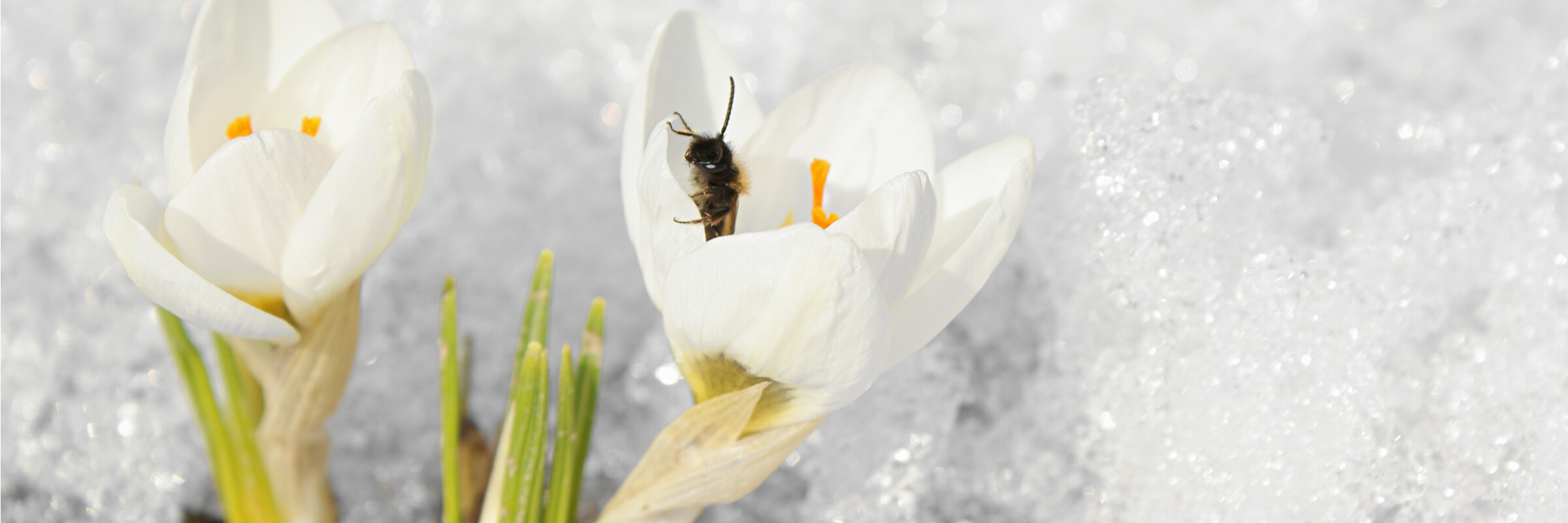Early spring can be a tough time for honey bee colonies. During the colder winter months, bees survive on stored honey and pollen gathered the previous year.
 In early spring, however, these stores are often depleted before new pollen and nectar are available in the quantities needed for robust colony growth. At this crucial time of the year, supplementary feeding may help the colony with laying, brood rearing and colony development.
In early spring, however, these stores are often depleted before new pollen and nectar are available in the quantities needed for robust colony growth. At this crucial time of the year, supplementary feeding may help the colony with laying, brood rearing and colony development.
Honey Bee Nutritional Requirements in Early Spring
Honey bees, like most animals, require a balance of nutrients in their diets. During the busy late spring and summer months, adult bees can survive almost exclusively on the carbohydrates found in nectar and honey. Producing and feeding developing brood, however, requires a more varied diet with adequate amounts of proteins, fats, minerals and vitamins. Pollen, an especially important source of protein for bees, provides the majority of these nutrients.
Depending on the exact location and time of year, available pollen sources may lack some of the amino acids required by brood for optimal growth and development. Providing pollen replacements in early spring is one of the best ways to ensure your colony has the nutrition it needs.
Regional Differences of Early Spring Food Sources
The availability of natural food sources — and the seasonal requirements of colonies — varies greatly by region and with yearly weather fluctuations. In the southern and southwestern portions of the US, for example, warmer temperatures in the winter generally means hives require less stored food to survive. Bees in some very warm areas may even find sufficient foraging opportunities for their hives to produce low levels of new brood throughout the winter.
In the colder climates found in the northern United States and Canada, however, foraging is often impossible for bees after late September or October. This longer period of scarcity requires northern honey bee colonies to store larger amounts of nectar and pollen during the busy spring and summer seasons compared to colonies in the south.
To adequately prepare for these colder winters, beekeepers in the north should ensure their hives contain approximately six combs of stored pollen. Beekeepers in all regions should ensure colonies have at least 60 to 90 pounds of stored honey by the time fall arrives.
High-Protein Supplements for Early Spring

High-protein supplements are an excellent way to provide honey bees with the nutrients and energy they need in early spring. There are many DIY recipes used by beekeepers that include combinations of sugar, brewer’s yeast, soy flour, essential oils and pollen collected form their own hives. These ingredients are typically mixed with sugar water or fructose to make a good supplement for early spring feeding.
While these mixtures may help the colony prepare for the upcoming spring nectar flow, beekeepers often find it easier to use a premade product. These supplements, like Dadant’s AP23 Pollen Substitute, take the guesswork out of selecting the right ingredients in the right proportions.
Have questions? Give us a call at 888.922.1293 or contact the closest Dadant branch.
For beekeeping equipment and educational materials, visit our online store.